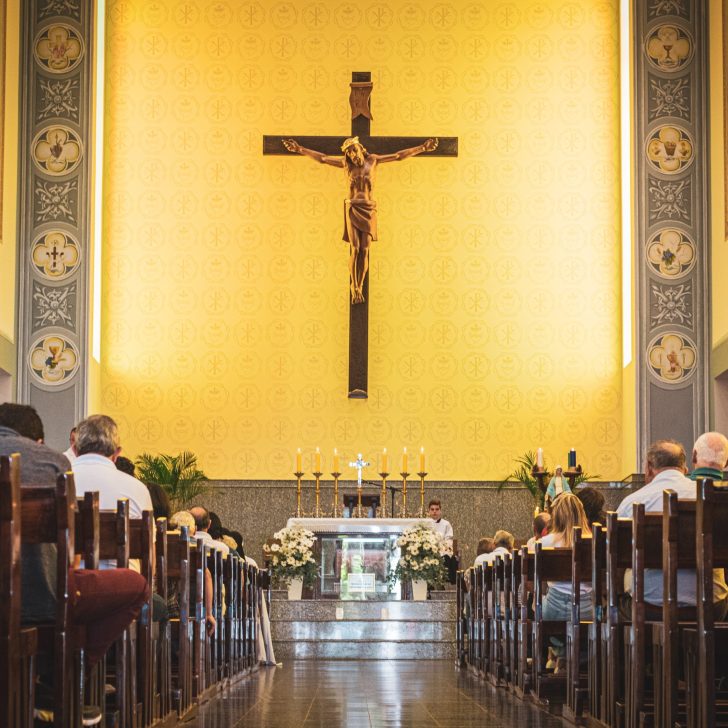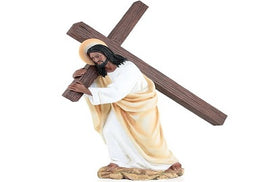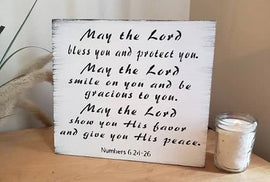How to Convert a Catholic to Christianity (& 10 Bible Verses to support it)

How to Convert a Catholic to Christianity (& 10 Bible Verses to support it)

Have you ever wondered how to help a Catholic friend or family member explore Christianity? It's more manageable than it may seem.
In fact, with the right approach and a genuine understanding of the differences between Catholicism and Christianity, it's possible to engage in meaningful conversations that can lead to spiritual growth.
Today I'll guide you through “How to convert a Catholic to Christianity” focusing on building trust, addressing sin, and the crucial role of Jesus and the Holy Spirit in salvation.
Short Summary
- Demonstrate genuine care & engage in open dialogue with Catholics.
- Find common ground to foster understanding and acceptance.
- Encourage Bible study, explore spiritual authority & consider alternative church models for conversion.
Building a Foundation of Trust
Before diving into theological discussions, it's essential to establish a foundation of trust with your Catholic friend or family member.
This foundation will be the basis for honest, open, and respectful conversations about faith.
One key aspect of building trust is demonstrating genuine care for the person, their beliefs, and their well-being. Luke 16:10 ESV is how we view our trust through others' viewpoints.
“One who is faithful in a very little is also faithful in much, and one who is dishonest in a very little is also dishonest.”
When conversing, ask yourself if you are a trustworthy friend to this person. If you have ever placed judgment on this friend, ask for a fresh start to a better relationship.
Additionally, engaging in open dialogue and finding common ground will help foster understanding and acceptance between you.
Demonstrating Genuine Care
Showing genuine care when sharing faith with Roman Catholics is vital, as it can create a safe space for dialogue and encourage a more meaningful exchange of ideas. Demonstrating genuine care involves:- Asking questions to gain a better understanding of the other person's perspective.
- Being patient and respectful.
- Actively listening without judgment.
“Then Joseph hurried out, for his compassion grew warm for his brother, and he sought a place to weep. And he entered his chamber and wept there.”
Joseph models the compassion we are to have with everyone, even if we come from different religions.
Try truly valuing their beliefs and experiences with religion. You show that you're not just trying to convince them to change their faith but genuinely want to learn from them and understand their spiritual journey.
Engaging in Open Dialogue
Open dialogue is essential for fostering a respectful exchange of ideas and beliefs with Roman Catholics.
Engaging in open dialogue is necessary to ask questions, listen to the other person's perspective, and be open to different interpretations.
Doing this creates a comfortable atmosphere for sharing ideas and emotions, ultimately bringing you closer together and deepening your bond.
Finding Common Ground
Finding common ground is another crucial aspect of building trust. It refers to a shared understanding or agreement between you and your Catholic friend or family member.
You can begin to share your faith and establish a trusting personal relationship by locating common ground.
It might involve discussing shared values, beliefs, or experiences, which can be a starting point for deeper conversations about faith.
It's incredible to hear someone else's story and for you to also share your walk with Christ.
Addressing the Issue of Sin
Once trust has been established, it's vital to address the issue of sin. Recognizing one's guilt is crucial in understanding the need for a Savior.
Matthew 18:15 ESV tells us how to address sin with a peer or friend.

“If your brother sins against you, go and tell him his fault, between you and him alone. If he listens to you, you have gained your brother.”
It can be intimidating to address someone else's sins when we are still trying to overcome our own.
However, give grace and compassion when facing this task. In the following sections, we'll discuss the nature of sin, its consequences, and the importance of redemption in overcoming sin and achieving salvation.
Discussing the Nature of Sin
Sin, in Catholicism, is seen as an offense against reason, truth, good deeds, and right conscience, leading to a lack of true love for God and others due to unhealthy attachments.
Ecclesiastes 7:20 ESV tells us that there is not a single man who is born into righteousness.
“Surely there is not a righteous man on earth who does good and never sins.”
We were all born into sin and will continue to sin throughout our walk with Christ. Through correction, application, and accountability, we can strive for righteousness.
When grasping the gravity of sin, it's essential to understand its effects, which include spiritual death, alienation from God, and everlasting punishment.
Emphasizing the Need for Redemption
Redemption is making up for our sins and faults, and we must be reconciled with God and receive His grace.
Jesus offers redemption through redemption. His ultimate sacrifice on the cross, dying for us and rising again to give us a chance to be saved and receive eternal life.
Ephesians 1:7 ESV lets us know the blood of Christ is for us.

“In Him we have redemption through his blood, the forgiveness of our trespasses, according to the riches of his grace.”
By understanding the importance of redemption, we can better appreciate the significance of Christ's sacrifice and its implications for our salvation.
Focusing on Jesus as the Sole Source of Salvation
As we discuss the importance of redemption, great salvation, and the role of Jesus in our salvation, it's crucial to emphasize that Jesus is the sole source of salvation.
Believing in Jesus as the Son of God and accepting His sacrifice for our sins is the foundation of the Christian faith.
2 Samuel 22:47 ESV is David's song of deliverance.

“The Lord lives and blessed be my rock, and exalted be my God, the rock of my salvation.”
Let's look closer at Christ's perfect sacrifice and the concept of salvation by grace through faith.
Examining Christ's Perfect Sacrifice
Christ's perfect sacrifice. Christians view his death on the cross as the ultimate and complete atonement for the sins of humanity.
This sacrifice made a new covenant with us in heaven, offering us a new life and the chance to be forgiven and saved if we accept it.
Jesus' death on the cross gives us a path to eternal life with God, emphasizing the significance of His sacrifice for mortal sin and our redemption and salvation in heaven.
Explaining Salvation by Grace Through Faith
Salvation is received by grace through faith, meaning that we are saved not by our works but by believing in Jesus as the Son of God and accepting His sacrifice for our sins.
Psalm 13:5 ESV is the trust and faith we put in our salvation.
“But I have trusted in your steadfast love; my heart shall rejoice in your salvation.”
My trust in the Lord builds up my faith to receive His salvation.
Encouraging Personal Bible Study
Personal Bible study is essential for deepening one's understanding of God's Word and growing in faith.
This section discusses overcoming reluctance to study scripture and providing resources and support for personal Bible study.
Hebrews 4:12 ESV explains why bible study is so important.

“For the word of God is living and active, sharper than any two-edged sword, piercing to the division of soul and of spirit, of joints and of marrow, and discerning the thoughts and intentions of the heart.”
Many people feel intimidated by the prospect of studying the Bible alone. They may feel overwhelmed by the sheer size of the Bible or lack confidence in their ability to interpret it.
However, diving into your Bible is what God calls us to do. We can only learn if we are willing to disrupt our comfort.
Overcoming Reluctance to Study Scripture
There could be various reasons for reluctance to study scripture, particularly among Catholics, such as feeling outdated, irrelevant, or difficult to understand.
To overcome reluctance when studying scripture, it's important to emphasize the relevance and importance of scripture in our lives and encourage an open-minded approach to studying it.
Providing guidance, support, and resources can also help individuals feel more comfortable and motivated to engage in personal Bible study.
Providing Resources and Support
Numerous resources and support are available for those looking to convert from Catholicism to Christianity, such as The Christian Network, books, and comprehensive lists of resources specifically for Catholic converts.
The Church also plays a significant role in personal Bible study, providing guidance, support, and a sense of community for those on their spiritual journey.
By offering these resources and support, we can help individuals grow in their faith and better understand the differences between Catholicism and many denominations of Christianity.
Discussing the Role of the Church
The Church plays a crucial role in the conversion process, particularly regarding spiritual authority and guidance.
Ephesians 1:22-23 ESV is what the Church means to the living God.

“And he put all things under his feet and gave him as head over all things to the Church, 23 which is his body, the fullness of him who fills all in all.”
Here I will explore the concept of spiritual authority and consider alternative church models that may better suit individuals on their journey from Catholicism to Christianity.
Exploring the Concept of Spiritual Authority
Spiritual authority is the influence or power a religious leader or figure has over their followers, involving the ability to interpret and apply religious teachings to guide others.
Three equally authoritative sources share spiritual authority in the Roman Catholic Church.
Understanding the concept of spiritual authority is crucial, as it can be used to shape our beliefs and behaviors and to control and manipulate us, leading to undesired results.
Considering Alternative Church Models
As we explore the role of the Church in the conversion process, it's essential to consider alternative church models that may better serve those on their spiritual journey.
Some alternative church models include house churches, missional communities, and organic churches.
Ephesians 4:11-13 ESV explains the members of the Church and their tasks when building up His Church.
“And he gave the apostles, the prophets, the evangelists, the shepherds, and teachers, 12 to equip the saints for the work of ministry, for building up the body of Christ, 13 until we all attain to the unity of the faith and of the knowledge of the Son of God, to mature manhood, to the measure of the stature of the fullness of Christ.”
These models often focus on living out the gospel in the local community, building relationships, and serving the community, providing a more personal and flexible approach to worship and spiritual growth.
By exploring these alternative models, we can better understand the diverse ways individuals can engage in Christian faith and practice.
Summary
In this blog post, we've explored the process of converting a Catholic to Christianity.
We hope this guide has provided valuable insights and tools to help you engage in meaningful conversations with your Catholic friends and family.
Remember, the journey of faith is a personal and ongoing process, and your support and understanding can make a significant difference in someone's spiritual growth. God bless!
Frequently Asked Questions
What are the steps to convert to Christianity?
Becoming a Christian requires believing that you are loved and accepted by the only God ever, admitting your sins, committing your life to Christ, and living a life of gratitude to Him.
These steps can lead to an amazing spiritual transformation and lifelong relationship with the Lord.
What is the easiest way to convert to Christianity?
The easiest way to convert to Christianity is by speaking with a pastor, getting familiar with Bible scriptures, attending church events and sermons, and ultimately baptism.
Selecting a Christian denomination and tolerating different beliefs is critical to converting to Christianity.
How long does it take to convert Catholics?
Depending on the individual's situation and familiarity with Catholic practices, it can take several months or even a year or two to convert to Catholicism.
Those already familiar with certain teachings of the faith may be able to convert in a shorter amount of time.
Becoming Catholic is a life-long journey that requires commitment and dedication to grow in faith and understanding.
What are the Catholic steps to conversion?
Conversion to the Catholic Church typically includes prayer, the study of the faith, repentance, and sacraments such as baptism, confirmation, and Eucharist.
Those interested in converting should receive religious instruction and guidance from a priest or knowledgeable layperson to ensure a successful transition.
In short, the steps to becoming a Catholic involve prayer, study, confession, and the reception of several sacraments.
SHARE:






















